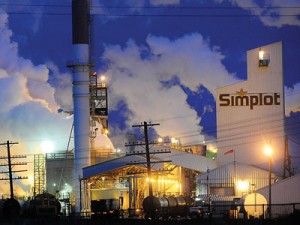IDAHO
 The J.R. Simplot Co. agreed to reduce emissions at its sulfuric acid plants in three states, which means its emission of harmful air pollution will be cut in half, according to officials.
The J.R. Simplot Co. agreed to reduce emissions at its sulfuric acid plants in three states, which means its emission of harmful air pollution will be cut in half, according to officials.
The company will also pay $42 million to settle Clean Air Act violations at its five sulfuric acid plants in Lathrop, California; Pocatello, Idaho and Rock Springs, Wyoming, according to authorities.
“Under this proposed settlement, Simplot must upgrade its pollution controls and cut harmful air pollution in half at its acid plants, bringing lasting benefits to communities in three states,” said Deputy Assistant Attorney General Sam Hirsch for the Justice Department’s Environment and Natural Resources Division.
Under the settlement, officials said Simplot will spend an estimated $42 million on pollution controls that will significantly cut sulfur dioxide emissions at all five plants. It will also fund a wood stove replacement project in the area surrounding the Lathrop plant.
Simplot’s Pocatello plant will receive $15 million in pollution control upgrades.
After the work is completed, the improvements will reduce the SO2 emissions from Simplot’s five sulfuric acid plants by more than 50 percent for approximately 2,540 tons per year of reductions —825 tons per year of which will be at the Pocatello plant.
Simplot will implement a plan to monitor SO2 emissions continuously at all five plants and pay an $899,000 civil penalty.
Additionally, officials said Simplot will spend $200,000 on a wood stove replacement mitigation project in the San Joaquin Valley, the location of Simplot’s Lathrop facility, to reduce emissions of fine particulate matter or PM2.5, as well as emissions of volatile organic compounds or VOCs, carbon monoxide or CO and hazardous air pollutants.
“This settlement helps address public health risks for local communities in California, Idaho and Wyoming, and furthers EPA’s commitment to reduce harmful air pollution from the largest sources,” said Cynthia Giles, assistant administrator for EPA’s Office of Enforcement and Compliance Assurance. “The system-wide pollution controls Simplot will install will significantly reduce sulfur dioxide emissions, which can cause serious respiratory problems and exacerbate asthma.”
The Department of Justice and EPA alleged that Simplot made modifications at its five sulfuric acid plants without applying for or obtaining the necessary Clean Air Act permits and obtaining “best available control technology” limits for SO2, as well as for sulfuric acid mist and PM2.5 at one of the sulfuric acid plants in Pocatello.
Short-term exposures to SO2 can lead to serious respiratory problems, including constriction of airways in the lungs and increased asthma symptoms.
Additionally, officials said SO2 is a precursor to the formation of PM2.5, which causes a wide variety of health and environmental impacts, including asthma attacks, reduced lung function and aggravation of existing heart disease.
Simplot’s Lathrop sulfuric acid plant is located in the San Joaquin Valley in California, which is currently classified as nonattainment for the PM2.5 National Ambient Air Quality Standards and has some of the most difficult challenges meeting those standards in the country.
SO2 is a precursor for the formation of fine particulates, so both the SO2 emission reductions from Simplot’s Lathrop plant and the wood stove replacement mitigation project will help reduce PM2.5emissions in the San Joaquin Valley, officials said.
The state of Idaho on behalf of its Department of Environmental Quality and the San Joaquin Valley Unified Air Pollution Control District are parties to the proposed settlement.

